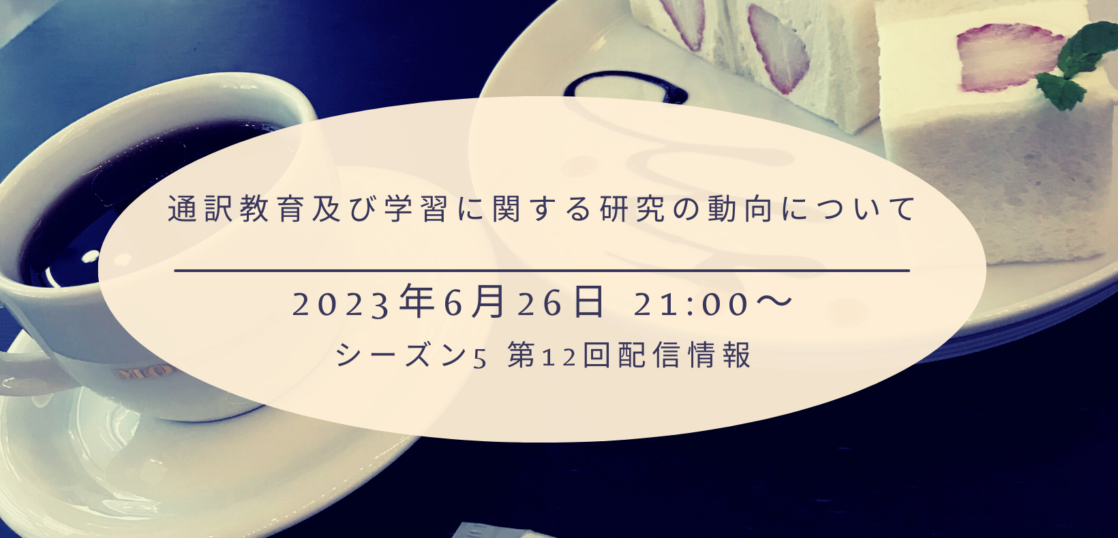今回のテーマは「通訳教育から学習へ」です。立教大学異文化コミュニケーション研究科の博士課程に在籍するベリャコワ・エレーナさんに以下の構成でお話いただきます。
- 通訳の教育及び学習に関する研究動向の振りかえり、また変わっていく通訳教育に対する考え方についての概観
- 2000年代に入ると、学習へのアプローチは従来の教師による一方的な知識の伝達から学生中心の学習へと変わり、協働学習及び自己調整学習が通訳翻訳研究において注目されるようになったこと(Kiraly, 2000; Moser-Mercer, 2008)
- 最近の動きとして、通訳教育における状況的学習(González Davies, 2016)を取り上げる研究が活発に行われるようになり、実践コミュニティにおける学習が取り上げられる例も見られるようになったこと(Cadwell, 2022)
- メタ認知スキルの育成が求められるようになり、振り返りなどの重要性が強調されている(Pietrzak, 2022)。MTの普及など、迅速に変わっていく環境に柔軟に適応できる能力(適応的熟達 adaptive expertise)も欠かせないであろうこと(Moser-Mercer, 2008; Angelone, 2022)
- 語学力をはじめ、日本の通訳教育の問題点について議論し、今後の通訳教育に求められるのは何か考えるための未来予想図
引用する文献
- Angelone, E. (2022). Weaving adaptive expertise into translator training. In G. Massey, E. Huertas-Barros & D. Katan (eds.). The human translator in the 2020s. Routledge
- ベリャコワE.(2021)「日本における日露通訳者養成に関する一考察」『通訳翻訳研究』 第21号:17-39.
- Cadwell P. et al. (2022). Communities of Practice and Translation: An Introduction, in Cadwell et al. (eds.), The Journal of Specialized Translation, 37.
- González-Davies, M. & Enríquez-Raído, V. (2016). Situated learning in translator and interpreter training: bridging research and good practice. The interpreter and translator trainer, 10-1, 1-11
- Herring, R.E., Swabey L., Tiselius E., Motta M. (2022). Re-examining “practice” in interpreter education. International journal of interpreter education, 14-1, 82-88.
- Kiraly, D. (2000). A social constructivist approach to translator education – Empowerment from theory to practice. St. Jerome Publishing.
- Moser-Mercer, B. (2008). Skill acquisition in interpreting – A human performance perspective. The interpreter and translator trainer, 2-1, 1-28.
- Pietrzak, P. (2022). Metacognitive translator training: Focus on personal resources. Springer.
- Sawyer D.B., Austermühl F. & Raído V.E. (2019). The Evolving Curriculum in interpreter and translator education. John Benjamins
ベリャコワ・エレーナ
ロシア語会議通訳者・翻訳者。
モスクワ大学附属アジア・アフリカ諸国大学日本文学研究科修士課程修了。
住友商事、東京大学での勤務を経て、医学、環境をはじめ幅広い分野における国際会議、商談等の通訳に従事。合同会社U&Lの代表社員。
通訳案内士資格保持(ロシア語・英語)。ロシア語通訳協会会員。
立教大学異文化コミュニケーション研究科博士課程後期課程在学。研究テーマはロシア語の通訳者の学習。
